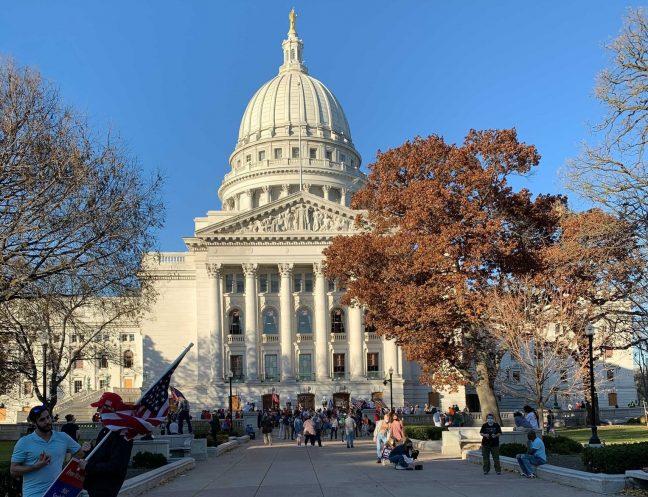I was nine years old when I first marched around the State Capitol building in Feb. of 2011.
As the son of a prominent state union leader, heading downtown for the anti-Act 10/recall-Walker protests became part of my daily routine. I would finish school, get in the car and drive downtown to walk around the bustling capital square.
To be perfectly honest, nine-year-old me barely understood what was going on. I knew we would walk, hold signs, sing songs and chant — to this day, “what’s disgusting? Union busting!” still plays in my head on repeat.
Elementary school me also had little to no understanding of the gravity Act 10 truly entailed — I just knew it was bad news. I knew it put my dad’s job on the line and I knew it impacted lots of other people’s livelihoods as well. In fact, police estimated upwards of 100,000 people attending these rallies at points.
Even in my simplistic understanding of the issue, I was right. Act 10 is, to date, one of the most disastrous pieces of legislation to come out of our state.
Teachers, firefighters, police officers, transit employees and state university professors are all public-sector professions that could, in theory, join a public-sector union, which would work with goverment and federal, state or municipal employees. These unions negotiate on employees’ behalf, to improve their working conditions, salary and benefits unilaterally. Unions then charge members monthly dues to support their operations.
But Act 10 bars public-sector unions’ rights to negotiate the terms of employee’s contracts with their employers.
With the passing of Wisconsin Act 10, overnight, government employees lost nearly all of their power to collectively bargain. This included, but was not limited to, losing the ability to negotiate their benefits and working conditions.
Act 10 also immediately required government employees to pay half their pension costs and a portion of healthcare premiums. Employees also were no longer required to pay monthly union dues.
Under the rules in Act 10 — which are still in place
— unionized employees receive little protection. Public sector unions in the state such as the Wisconsin Education Association Council and state chapters of national unions like the American Federation of State County and Municipal Employees have been incredibly limited in their ability to bargain.
Gov. Tony Evers invests $43 million in rural development, to aid contemporary economic depression
Under the policy, these unions may only negotiate their member’s wages up to — but not exceeding — the Consumer Price Index, which measures price levels of goods and services produced in an economy. The unions also have to hold a yearly meeting of members, where they must vote to preserve the union. In practice, this requires nearly all members to be present — absent members essentially count as a ‘no’ vote.
With Feb. marking ten years since the protests began, it is well past due to begin the process of reversing the Act 10-era policies. In an effort to correct his predecessor’s disastrous legislation, Governor Evers’ new budget allows certain “frontline workers” to begin collective bargaining again. But this terminology is loosely defined because it includes a wide range of groups and workers who interact with the public.
This is the major flaw with Evers’ verbiage — that the terms are vague and the plan arrived a little too late. The state is seeing major gaps in education, with districts failing to attract or hold on to teachers. In the 2015-2016 school year, 56% of districts in northern Wisconsin faced extreme teacher shortages. And who would blame teachers for not wanting to work in Wisconsin?
Teachers who go one state over to Illinois or Minnesota receive access to unions and collective bargaining, with the ability to negotiate for higher wages and better benefits. The same is true for other public sector careers as well.
Ever’s budget must now move to the Republican-controlled legislature, where GOP legislators will likely edit, if not entirely remove, the collective bargaining clauses. State Republicans need to look at the numbers and accept that Act 10 is failing our state.
Political Stalemate: Wisconsin Republicans must compromise with state Dems on COVID-19 legislation
Without unions, state employees have had to fend for themselves, which has led to Wisconsin falling behind, with major employee shortages in our prisons and schools, all of which the COVID-19 pandemic have exacerbated.
Wisconsin is a state that has prided itself on a strong history of union movements. Our state saw advocates march for the eight-hour workday and for better manufacturing conditions. In 2011, Wisconsin set the stage for one of the largest union demonstrations of all time, where this history was celebrated and advanced.
But where are we now? Unions are fighting for whatever scraps they can get. They are under constant threat of dissolving entirely and are limited to negotiations on wages, capped by the Consumer Price Index.
Governor Evers has finally taken the initiative to correct these conditions, but it is dependent on the state Republicans to take charge and support our public sector employees’ rights — but I wouldn’t hold my breath.
Ryan Badger ([email protected]) is a sophomore majoring in political science.





















